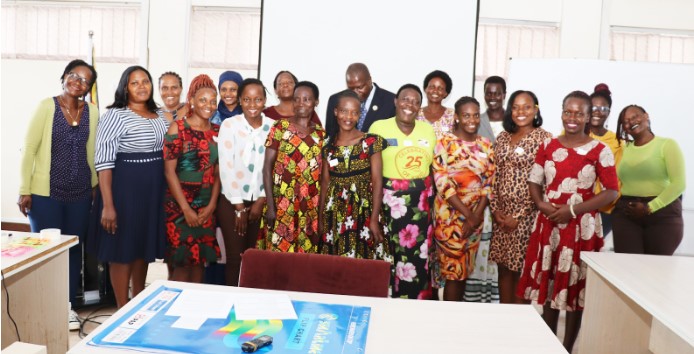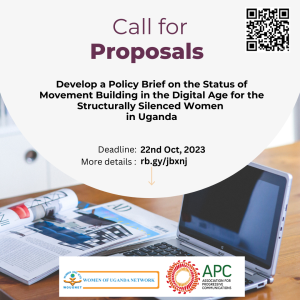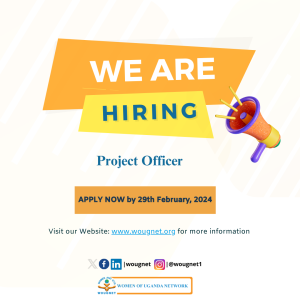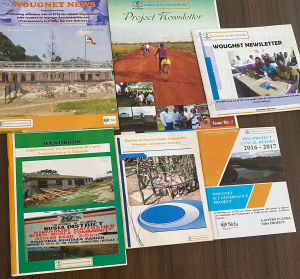Science, Technology, Engineering and Mathematics (STEM) is an educational program developed to prepare primary and secondary students for college, graduate study and careers in the fields of Science, Technology, Engineering and Mathematics (STEM).
World over, the representation of women and girls in STEM fields is significantly lower than men, resulting in a large gender gap. Causes of gender imbalance in STEM subjects include girls’ negative perceptions and low self-esteem, lack of role models, and discouragement from teachers and parents, which makes the girls end up doing courses like hairdressing and liquid soap making. Additional factors include limited funds, lack of digital tools like smart phones and laptops, low literacy levels by women, social norms that make people think that women are meant to be in the kitchen. All these factors keep women from participating in STEM.
To further understand the underrepresentation of women and gender analysis in STEM, on the 12th to 14th of September 2023, WOUGNET organized a research workshop in collaboration with Makerere University and University of Cape Town (UCT) under the pathways to change project; Towards Gender Justice in STEM Research in Africa (GeJuSTA), where 16 women(participants) discussed the reasons for this underrepresentation, putting the main focus on the fields of Information Technology, Data Science, Human-Computer-Interaction and Information and Communication Technologies for Development. These women included those who participated in the previous WOUGNET projects including WOUGNET members. The main objectives of the research workshop were; to identify and understand gender analysis approaches, to identify gender analysis for co designing digital platforms for women to use, and to identify what needs to go into a good Gender Analysis for ICT or digital projects.
Below are holistic approaches/methods that were identified to address the underrepresentation of women and lack of gender analysis in STEM research, and to understand the relationship between men and women, their access to resources, activities and the constraints they face relative to each other.
Gender parity approach which ensures there are equal numbers of men and women in activities like digital trainings.
Digital inclusion approach that focuses on offering digital literacy classes to women.
Women’s Economic Empowerment approach aiming at supporting women to be entrepreneurs, support/start their own business,
Right-based Approach which advocates for equal rights, informing women of their rights and supporting them in achieving them.
Approach focusing on material resources. How much access to income do women have compared to men? How do they access the household funds? What access to credit do they have?
Approach focusing on time, that is how much time women and girls spend on unpaid care work compared to men and boys, how much self- directed time they have to develop career wise.
Gender Transformative Approach that focuses on working with not just women and girls, but also men and boys, reflecting on the root causes of gender inequality (social norms, roles, relations). With such approaches, the issue of underrepresentation of women in STEM can be addressed.
What needs to go into a good Gender Analysis for ICT or Digital Projects
- There is need for resource mobilization, awareness creation and capacity building to implement and sustain the projects.
- Involvement of all stakeholders like academia and the government in the planning and implementation process.
- Use of an inclusive language, for example, translation and interpreters for those who do not understand the language.
- Additionally, more women and girls should be engaged in digital programmes.
- There is a need for resources to buy digital gadgets, data/ internet for connectivity.
- Advocacy for better infrastructure eg better network and equal power distribution.
- Use of art and stories for advocacy,
- Creating wellness and safe space for women where they can air out their views and challenges they encounter in STEM.
- Digital security and safety, that is, anonymous toolkits, considering the cultural norms, law and policy review/analysis.
In conclusion, teachers, parents, and STEM professionals can work together to help engage young girls and get them excited about STEM. By demonstrating that there are active people working to help girls be more involved, we fight the sexism and stereotypes that girls may experience in these fields.
Written by: Babirye Roseline, Program Assistant Gender and ICT Policy Advocacy






